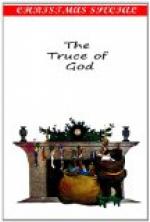Being not displeased with himself, he turned at last toward Joan and put a hand over hers.
“You see,” he said, “I am not so hard a man. By this Christian act shall I celebrate your arrival.”
But the Jew did not come. The singers learned the truth, and sang with watchful eyes. The seigneur’s anger was known to be mighty, and to strike close at hand.
Guillem, the gaoler, had been waiting for the summons.
News had come to him late in the afternoon that had made him indifferent to his fate. The girl Joan, whom he loved, had come up the hill at the overlord’s summons. So, instead of raising an alarm, Guillem had waited sullenly. Death, which yesterday he would have blenched to behold, now beckoned him. When he was brought in, he stood with folded arms and asked no mercy.
“He is gone, my lord,” said Guillem, and waited. He did not glance at the girl.
“Gone?” said Charles. Then he laughed, such laughter as turned the girl cold.
“Gone, earth-clod? How now? Perhaps you, too, wished to give a hostage to fortune, to forestall me in mercy?”
He turned to the girl beside him.
“You see,” he said, “to what lengths this spirit of the Holy Day extends itself. Our friend here—” Then he saw her face and knew the truth.
The smile set a little on his lips.
“Why, then,” he said to the gaoler, “such mercy should have its reward.” He turned to Joan. “What say you? Shall I station him at your door, sweet lady, as a guard of honour?”
Things went merrily after that, for Guillem drew a knife and made, not for the seigneur, but for Joan. The troubadours feared to stop singing without a signal, so they sang through white lips. The dogs gnawed at their bones and the seigneur sat and smiled, showing his teeth.
Guillem, finally unhanded, stood with folded arms and waited for death.
“It is the time of the Truce of God,” said the seigneur softly, and, knowing that death would be a boon, sent him off unhurt.
* * * * *
The village, which had eaten full, slept early that night. Down the hill at nine o’clock came half a dozen men-at-arms on horseback and clattered through the streets. Word went about quickly. Great oaken doors were unbarred to the news:
“The child Clotilde is gone!” they cried through the streets. “Up and arm. The child Clotilde is gone.”
Joan, deserted, sat alone in the great hall. For the seigneur was off, riding like a madman. Flying through the Market Square, he took the remains of the great fire at a leap. He had but one thought. The Jew had stolen the child; therefore, to find the Jew.
In the blackest of the night he found him, sitting by the road, bent over his staff. The eyes he raised to Charles were haggard and weary. Charles reined his horse back on his haunches, his men-at-arms behind him.




